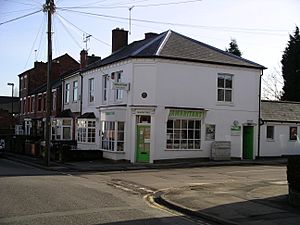Samaritans (charity) facts for kids

Samaritans logo as of 2019
|
|
| Formation | 1953 |
|---|---|
| Headquarters | Ewell, England |
|
Region served
|
See also International reach |
|
Founder
|
Chad Varah |
| Website | samaritans.org |
Samaritans is a well-known charity in the United Kingdom and Ireland. Its main goal is to provide emotional support to anyone who is feeling upset, having a hard time, or thinking about ending their life. They are famous for their telephone helpline that anyone can call.
The name "Samaritans" comes from a story in the Bible called the parable of the Good Samaritan. However, the charity itself is not religious and helps people of all beliefs.
Samaritans is part of a worldwide network called Befrienders Worldwide. This network connects similar help services from all over the globe.
Contents
History of Samaritans
Samaritans was started in 1953 by a church leader named Chad Varah. He was inspired to create the service after a sad event. A 14-year-old girl had died because she was very worried about something and felt she had no one to talk to. Chad Varah wanted to make sure that no one else would feel so alone. He put an ad in a newspaper asking for volunteers to listen to people who needed someone to talk to.
The idea became very popular. In just ten years, 40 Samaritans branches opened. Today, there are 201 branches across Great Britain and Ireland. The charity is run by over 21,000 trained volunteers.
The name "Samaritans" was first used in a newspaper headline in 1953, and it stuck.
In 2004, the charity launched a campaign to find more young volunteers. The campaign was supported by Phil Selway, the drummer from the band Radiohead, who was a Samaritans volunteer himself.
How Samaritans Helps People
Samaritans offers help in many different ways. The main service is a free telephone helpline that is open 24 hours a day, every day of the year. It was the first 24-hour helpline in the UK.
Different Ways to Get Support
Besides the phone line, Samaritans also offers support through:
- Face-to-face visits: You can go to a local branch to talk to a volunteer in person.
- Email and chat: Since 1994, you can email Samaritans for support. They also have an online chat service.
- Events: Volunteers often go to festivals and other events to offer support.
- Prisons: They train prisoners to become "Listeners," who can then support other inmates.
In 2009, Samaritans was given a special, free phone number: 116 123. This number works from both landlines and mobile phones across the UK and Ireland.
Who Can Contact Samaritans?
Many people call because they feel sad, lonely, stressed, or just need to talk something over.
The volunteers are trained to be good listeners. They don't judge or give advice. Instead, they ask questions to help people understand their own feelings and find their own solutions.
Keeping People Safe Online
In 2022, Samaritans worked to make the internet safer. They believe that online safety laws should do more to protect people from harmful content.
Keeping Calls Private
Samaritans has a very strict rule about keeping conversations private. This is called confidentiality. Whatever you tell a volunteer is kept secret, even after you are no longer in contact with them.
There are only a few very specific situations where they might break this rule. This could be if someone is in immediate danger, if there is a threat of terrorism, or if a child's safety is at risk.
Samaritans Around the World
Through its email and online services, Samaritans helps people from all over the world.
The charity's global work is done through Befrienders Worldwide. This is a network of over 400 centers in 38 countries that offer similar listening services. Some of these centers, like those in Hong Kong, India, and the United States, also use the name Samaritans.
Other Helpful Charities
There are other charities that offer similar listening services, often for specific groups of people.
- Nightline is a service run by students for students at universities.
- Shout is a free 24/7 text message support service in the UK for anyone who is struggling.
- Childline is a helpline for children and young people in the UK and Ireland.
- Aware is an Irish charity that supports people experiencing depression.
See also
- Mental health in the United Kingdom
- Andy's Man Club - Men's talking group
 | Leon Lynch |
 | Milton P. Webster |
 | Ferdinand Smith |


